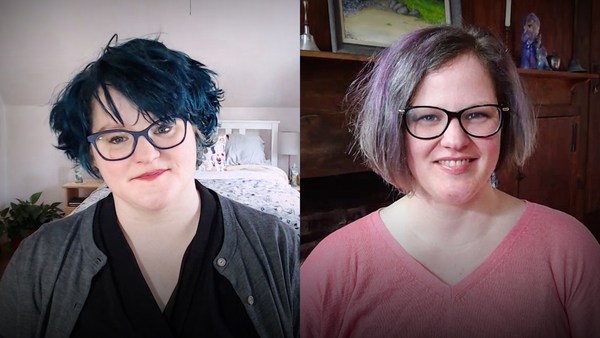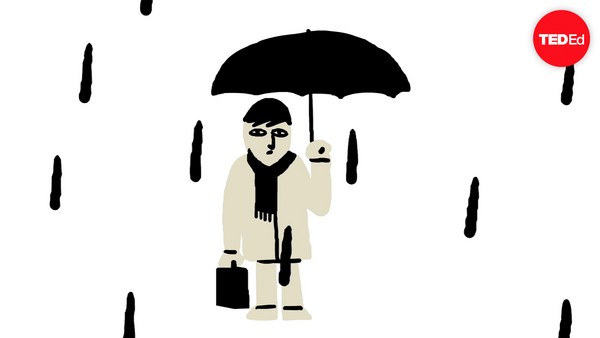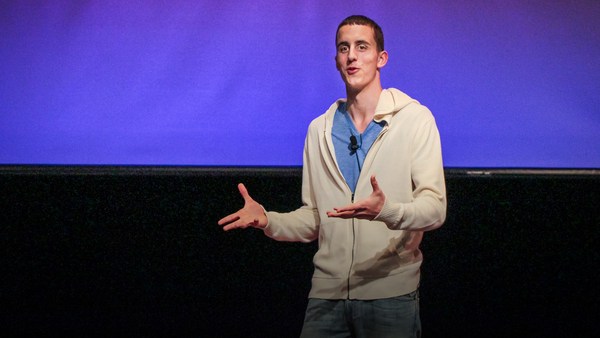So I lead teams of data scientists and we solve business problems using difficult analytics. And when I start working with someone new, I ask them how I will know if they're struggling. And I don't mean struggling with a business problem or with a difficult analytics. They don't struggle with that. I mean struggling with their mental health.
And to make them feel comfortable to tell me, because I want them to tell me, I tell them how they will know if I'm struggling. So I might be just unrealistically calm, or they might get any kind of message from me at all before nine in the morning. Because I'm not a morning person, message before nine, very bad sign.
Now, I do this because I have suffered from anxiety and depression and it was horrible. And if there was a magic button I could press that would rid the world of those two things, I'd press it straight away. But if that button only worked for me, if all it meant is that I wouldn't have got depressed, I'd leave it alone.
And that's because of some things that happened in the weeks and months as I was recovering from depression, but also things that happened years later when I started talking about it at work, and it improved my relationships with colleagues. So let's step back in time.
It's 2012, it's a Friday morning in May and the sun is out in London, and I'm walking to work along the banks of the Thames. And all around there are British flags flying. And there's this quiet excitement in the city. And that's because the Olympics were coming there in two month's time. And that morning, like every other morning at the time, I'd woken up about three hours earlier than normal thinking and worrying about work. And I'd got up just retching with anxiety and gone to the bathroom and been sick. And I felt a bit better after that, made my way to work.
But by the time I got to work, I could barely speak. So I could just about order a cup of coffee. But apart from that, for the mornings, I was pretty much silent. And coffee was about the extent of my diet, so I'd pretty much given up eating. And that's probably not what you would have expected if you'd been walking past me on that sunny Friday morning with the flags flying and the Olympics coming.
And after a couple of weeks things hadn't got any better and so I decided I shouldn't go to work. So I phoned the team and told them, and a few days later, I got professional help. And what a difference that made.
So my psychologist gave me really simple, practical advice. Things like, you really need to eat because feeling anxious and feeling hungry are very similar feelings in your body. Another bit of advice was, don't get up and go to the bathroom and be sick. Get up, go to the kitchen, make a cup of tea, read a book. So I did that, helped a bit with the morning vomiting.
I had to learn how to switch off from work. Now anyone can stop working. That's easy. The difficult thing is stopping thinking about work. And to do that, I would imagine a green force field around the house that would keep thoughts of work out. And I still switch that force field on from time to time. It helps me put off until tomorrow things that I could do today. If I do them tomorrow, they'll be a bit rushed. They will be less good, but they'll be good enough.
And my wife, who saw this change in my working patterns, was convinced I was going to get fired. I actually have been promoted twice since then. Now I also had to learn how to enjoy spending time with my wife and with my family and friends. And it sounds easy, but it really wasn't at first.
So I remember going out for a pizza with the family, and all I wanted to do was lie on the floor, curl up into a ball and groan. Now, fortunately for everyone in the pizza restaurant, I didn't do that. But it was still really awkward because all I could think of to talk about was how miserable I was. Anyway, with a bit of practice, it got less awkward. I got a bit less self-absorbed and I learned to enjoy other people again.
And one day, about a few weeks after I first got professional help, I woke up in the morning feeling fine, just feeling normal. And I have done every day since then.
Now, some people can do a really good job at work when they're anxious or depressed. And I am not one of those people. So I really did a terrible job. The team had to carry me. It's really very difficult to contribute if you can't speak all morning. It was the first time I'd ever really failed at anything.
And I can't tell you how comforting it is now to know that I can fail at something, even something quite important, life will go on and I'll be fine. And because I'd done such a terrible job at work, I didn't want anyone to know about it. It was this kind of shameful secret. So the strange thing is what happened when I did start talking about it at work, and it started very privately. So if I was working with someone and it seemed like they were struggling, I'd tell them some of my story. That seemed to help a bit. It wasn't as awkward and horrible as I thought it might be.
So I got a bit braver and I said to our HR team, "If you come across someone who's struggling with their mental health, I'll be happy to talk to them one-on-one if you think it would help." I did that a few times and I still do. And what that meant was when the HR team were putting together a booklet about what to do if you're struggling with your mental health, they asked me and some other people to share our stories anonymously. And I did that. But when I sent the message, I asked them to print my name next to it.
Now, have you ever sent a message and thought, "I wonder if that was a good idea?" So that was what I felt. And I was quite scared, it was going to hundreds of people, there was no going back. It was in writing.
And I was worried people would think it would happen again and they wouldn't want to work with me. I was worried they'd think I was weak and self-indulgent, and maybe some people do. And I was worried that even if they didn't think either of those things, it would just be on their minds when they were talking to me later on. That's not what happened.
What actually happened was people got in touch to say there was really comforting to have someone quite senior say, "I had this experience. It was horrible. I got through it, I'm still here and I'm doing fine."
And gradually I started talking about it to larger and larger audiences. So there's a podcast about it. We did a session for people who were struggling during lockdown, and if you're not sick of hearing about me being sick in the mornings, you can read about it on two websites. And one day, about ten years after that sunny day in London, I stood up in front of 600 of my colleagues and told them the full story.
And after that, people from all levels of the company, right up to the very top, took me aside and shared that they had either been through something like that, or they were going through something like that at the time. And then I'd say the most common emotion that I picked up from them was relief, that they were just relieved that someone was talking about it openly. One person actually took me aside on the stairs more than a year later, to say that it had given him that push he needed and wanted to go and get some help for some things he was struggling with at the time.
Now, one of the people in that audience of 600 was new to the company. And she said to me, "Hearing that talk made me feel like this was my kind of place." And I think she actually got to the bottom of what it made me feel like. So if I could stand up in front of all my colleagues and tell them this story that had been terribly embarrassing and upsetting and shameful, felt shameful at the time, and I was fine, well, it made it feel like my kind of place too.
And we know from Amy Edmondson's work on psychological safety that that feeling improves the performance of teams. Now, I didn't stand up and tell 600 people about vomiting in the morning to improve their performance, but if it does, I'll take it, that's great.
It is possible to go too far with this, and I know that because I did. So I got some great anonymous feedback that said, "Adam is always talking to me to make sure I'm not depressed or anxious. He never talks to me about work or my career." So after that I changed a bit what I talk to people about.
Now, I'm not saying that if you've suffered from mental illness, you should tell everyone at work all about it. If you're experiencing it now, you probably won't regret telling someone you trust. If you've recovered, you may find, like me, that telling people about it goes better than you expect. There's no guarantees and there's still plenty of prejudice around.
Nor am I saying that if you are suffering from anxiety or depression, you should be really thankful because of all these terrific benefits you're going to get that I got, and it's good for your character. I'm not saying that at all. It's really horrible and I feel for you.
If you are lucky enough to be able to get professional help, please do. I cannot tell you how much of a difference that has made to my life. If you can't get professional help, look for free resources online. And in either case, remember that you're not the first person to have gone through something like this, that depression and anxiety are treatable. And that you are not alone.
Now on that sunny Friday morning in London, I had no idea that within a few months I would have recovered to something better than I was before I started to get anxious. And when I felt really worried, sending the message to the HR team about printing my name next to my story, I had no idea what would follow from that and how beneficial it would be for me and for other people.
There's no guarantees that anyone else will experience the same thing. And that's why if there was this magic button for ridding the world of anxiety and depression, I'd press it straight away. But unfortunately that button is still an imaginary button. It's not real. And while it stays like that, I think we would all do better by talking about it.
Thank you.
(Applause)





